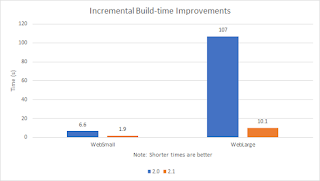Microsoft announced yesterday the availability of .NET Core 2.1. A grind placed primarily under the sign of performance.
First, your projects will compile faster. According to Microsoft, thanks to the incremental compilation, the compilation time of large projects is drastically reduced.
Compiling faster is good, running faster is better. Microsoft has worked on the issue and proposes with this version a multilevel JIT (Just-in-Time) compiler.
At the first level, the JIT compiler generates native code as quickly as possible, but not as fast as possible. In other words, the generated native code contains few optimizations. With this approach the JIT compiler works faster and more seamlessly with execution.
More comes the second level. The compiler detects the frequently called code portions. For these portions better optimization is justified, and the compiler recompiles code as optimized as possible. This new code will come in replacement of code generated at the first level. Second-level compilation is done in parallel, eliminating the tension between fast compile speeds and optimal code output
As it stands, the two-level compilation of the JIT must be triggered by positioning an environment variable:
COMPlus_TieredCompilation = "1"
.NET Core 2.1 supports two new platforms: SLES: 12+ and Alpine: 3.7+.
Supported platforms are now, in total:
Windows Client: 7, 8.1, 10 (1607+)
Windows Server: 2008 R2 SP1 +
macOS: 10.12+
RHEL: 6+
Fedora: 26+
Ubuntu: 14.04+
Debian: 8+
SLES: 12+
openSUSE: 42.3+
Alpine: 3.7+
.NET Core 2.1 comes with many new cryptographic APIs, and support for Brotli, an open compression algorithm proposed by Google.
Finally, .NET Core 2.1 will benefit from long-term support. This means it will be supported by Microsoft for three years. We recommend that you make .NET Core 2.1 your new standard for .NET Core development, Microsoft says.
A small number of important updates will be pushed in the next 2-3 months, then Microsoft will officially declare that .NET Core 2.1 is an LTS version. After that come updates will be focused on security, reliability and the addition of platform support (eg, Ubuntu 18.10). We recommend that you start adopting .NET Core 2.1 now insists Microsoft.
